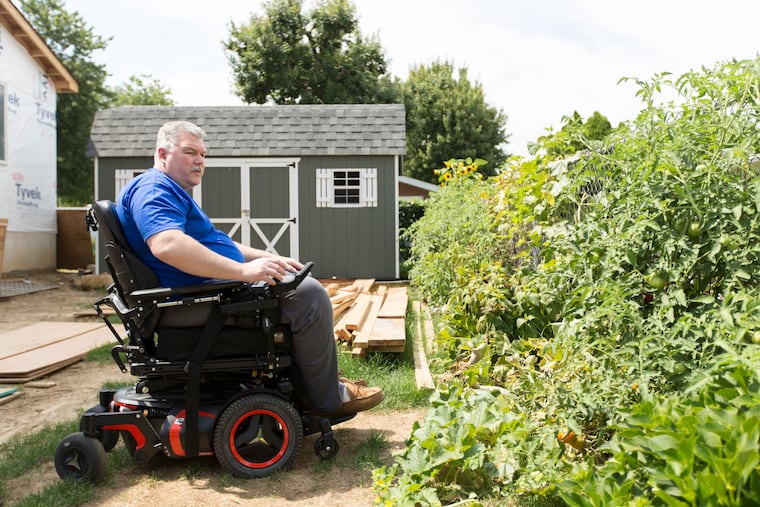$20.5M settlement awarded to injured sheriff’s deputy in Philly courthouse elevator crash
Then-Sgt. Paul Owens was in an employee elevator at the Criminal Justice Center courthouse when it crashed through the 15th-floor ceiling of the 17-story courthouse around 10:20 a.m. Aug. 4, 2016, and smashed into an equipment room.

A Philadelphia sheriff’s deputy paralyzed in a 2016 courthouse elevator crash has been awarded $20.5 million to settle claims that faulty repairs caused the crash, his attorney said.
Paul Owens, then a sergeant in the Sheriff’s Office, was inside an employee elevator at the Criminal Justice Center at 13th and Filbert Streets when the elevator car rocketed through the 15th-floor ceiling of the 17-story building about 10:20 a.m. on Aug. 4, 2016, and smashed into an equipment room. He was taken to Hahnemann University Hospital in critical condition with severe head, rib, vertebrae, and chest injuries.
Owens and his wife, Heather, filed the lawsuit in January 2017.
An improper elevator repair several years earlier led to the crash, their attorney, Michael V. Tinari, said.
“They’re satisfied that the matter’s over, and happy with the amount of money, because it will take care of Paul’s future medical costs and living needs,” Tinari said Monday. The Owenses will receive the settlement amount minus costs and fees, he said.
The lawsuit named as defendants the Philadelphia Municipal Authority, a city governmental authority that acts as landlord for city-owned buildings and owns the courthouse; U.S. Facilities Inc., a Philadelphia-based company that the authority hired to operate and maintain buildings; Thyssenkrupp Elevator Corp., a subsidiary of the German conglomerate Thyssenkrupp AG, with U.S. headquarters in Troy, Mich.; and Schindler Elevator Corp., locally based in Moorestown.
Amended complaints filed this year added as defendants Otis Elevator Co. of Farmington, Conn., and Amtech Elevator Services, an Otis subsidiary.
The lawsuit was settled Thursday evening in mediation, said Tinari, who represented the plaintiffs with attorney Christopher Fleming. Tinari, citing confidentiality, said he could not disclose how much each defendant would contribute to the settlement.
"Defendants were jointly responsible for the proper maintenance, repair, inspection and upkeep of the [building], including the elevators, " the lawsuit said, adding that the crash was “caused by and due solely to the negligence, carelessness, and reckless behavior” of the defendants.
The elevator in which Owens was riding was made by Dover Corp., which in the late 1990s sold its elevator division to the company that later became Thyssenkrupp. Thyssenkrupp had the contract to service and maintain the courthouse elevators from 2006 to 2008, followed by Amtech and Otis until October 2013, then Schindler until July 1, 2016, when Thyssenkrupp took over again, Tinari said.
Tinari said that several years before the crash, workers improperly installed bolts during a repair of a ring gear in the elevator. Over time, seven bolts broke, and when the last remaining bolt broke, it "allowed for the rapid ascension of the elevator car which Paul was in,” he said.
“We allege that was the cause of the crash,” he said, adding that the defendants denied it was the cause.
Ted Schaer and Gregory Mallon, attorneys for U.S. Facilities, said in an email Tuesday that the company’s “contribution to the settlement was minimal as all elevator maintenance and repair work was subcontracted to certified elevator contractors per City of Philadelphia requirements. U.S. Facilities continues to deny any claim related to this unfortunate incident,” is pleased the matter was resolved amicably, and wishes the Owens family well.
Lawyers for the Philadelphia Municipal Authority, Otis Elevator, and Thyssenkrupp had no comment on the settlement.
A Schindler spokesperson said Tuesday that the company was pleased to see the matter resolved and wished the Owenses well. “Schindler was neither the elevator service provider when the subject event occurred, nor was its equipment involved,” a statement said. "Schindler continues to deny any claim asserted against it in the suit, but contributed a very minor amount to the overall settlement in the interest of avoiding further litigation expense and obtaining finality.”
Tinari said it was important to Paul and Heather Owens that after the filing of the lawsuit, rope grippers were installed on the elevators at the Criminal Justice Center. He also said that the elevators or elevator parts in the building would be replaced.
Hollister-Whitney Elevator Corp. of Quincy, Ill., had introduced its trademarked Rope Gripper emergency brake, which uses a set of vise-like jaws that automatically clamp shut and stop an elevator car if it ascends or descends too rapidly, after two accidents in Canada in the 1980s drew attention to what mechanical engineers call “ascending car overspeed.”
Philadelphia city spokesperson Mike Dunn said in an August 2017 Inquirer and Daily News article that the city’s courts spent $572,855 installing rope grippers on the courthouse’s six public elevators. On Tuesday, Dunn said construction is scheduled to begin in April on a three-year, $13 million “modernization project” in which all passenger and freight elevators and their components will be replaced.
Owens, 51, is unable to walk and uses a wheelchair, but is “stoic and hopeful,” said Tinari. He and his wife have had their home completely renovated to be ADA-compliant, Tinari said.
Owens spent five weeks in a coma at Hahnemann University Hospital. Later, he was transferred to Magee Rehab, then was released Jan. 24, 2017. A 28-year veteran of the Sheriff’s Office, he was promoted from sergeant to lieutenant during his hospitalization.
In a July 2017 whistle-blower lawsuit filed against U.S. Facilities, Duilio “Lou” Angelini, a former U.S. Facilities manager assigned to the Criminal Justice Center, contends he warned company officials of lax maintenance and dummied-up inspection reports for the courthouse elevators.
The lawsuit, which has since been moved to U.S. District Court, is pending trial. Lawyers representing U.S. Facilities in the federal lawsuit have denied Angelini’s allegations.